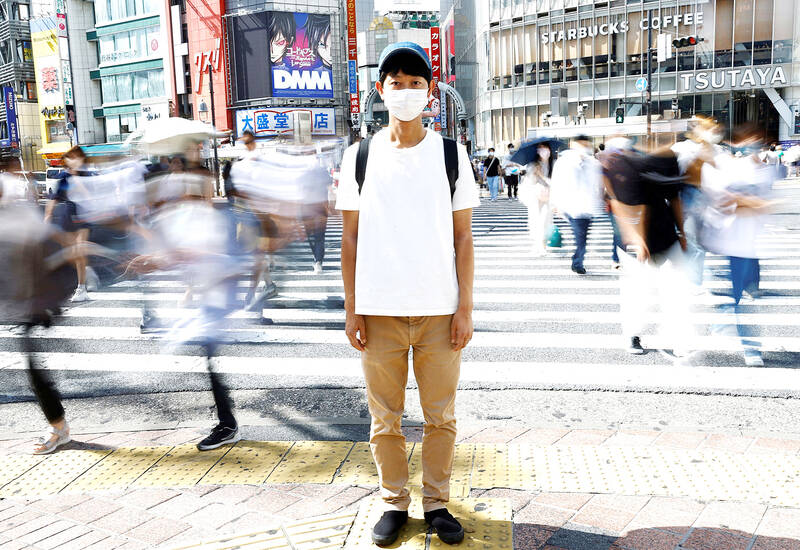Shoji Morimoto has what some would see as a dream job: he gets paid to do pretty much nothing.
The 38-year-old Tokyo resident charges 10,000 yen (US$71) an hour to accompany clients and simply exist as a companion.
“Basically, I rent myself out. My job is to be wherever my clients want me to be and to do nothing in particular,” Morimoto said, adding that he had handled some 4,000 sessions in the past four years.

Photo: REUTERS
With a lanky build and average looks, Morimoto now boasts nearly a quarter of a million followers on Twitter, where he finds most of his clients. Roughly a quarter of them are repeat customers, including one who has hired him 270 times.
His job has taken him to a park with a person who wanted to play on a see-saw. He has also beamed and waved through a train window at a complete stranger who wanted a send-off.
Doing nothing doesn’t mean Morimoto will do anything. He has turned down offers to move a fridge and go to Cambodia, and doesn’t take any requests of a sexual nature.
Last week, Morimoto sat opposite Aruna Chida, a 27-year-old data analyst clad in a sari, having a sparse conversation over tea and cakes.
Chida wanted to wear the Indian garment out in public but was worried it might embarrass her friends. So she turned to Morimoto for companionship.
“With my friends I feel I have to entertain them, but with the rental-guy (Morimoto) I don’t feel the need to be chatty,” she said.
Before Morimoto found his true calling, he worked at a publishing company and was often chided for “doing nothing.”
“I started wondering what would happen if I provided my ability to ‘do nothing’ as a service to clients,” he said.
The companionship business is now Morimoto’s sole source of income, with which he supports his wife and child. Although he declined to disclose how much he makes, he said he sees about one or two clients a day. Before the pandemic, it was three or four a day.
As he spent a Wednesday doing nothing of note in Tokyo, Morimoto reflected on the bizarre nature of his job and appeared to question a society that values productivity and derides uselessness.
“People tend to think that my ‘doing nothing’ is valuable because it is useful (for others) ... But it’s fine to really not do anything. People do not have to be useful in any specific way,” he said.

In the March 9 edition of the Taipei Times a piece by Ninon Godefroy ran with the headine “The quiet, gentle rhythm of Taiwan.” It started with the line “Taiwan is a small, humble place. There is no Eiffel Tower, no pyramids — no singular attraction that draws the world’s attention.” I laughed out loud at that. This was out of no disrespect for the author or the piece, which made some interesting analogies and good points about how both Din Tai Fung’s and Taiwan Semiconductor Manufacturing Co’s (TSMC, 台積電) meticulous attention to detail and quality are not quite up to

April 21 to April 27 Hsieh Er’s (謝娥) political fortunes were rising fast after she got out of jail and joined the Chinese Nationalist Party (KMT) in December 1945. Not only did she hold key positions in various committees, she was elected the only woman on the Taipei City Council and headed to Nanjing in 1946 as the sole Taiwanese female representative to the National Constituent Assembly. With the support of first lady Soong May-ling (宋美齡), she started the Taipei Women’s Association and Taiwan Provincial Women’s Association, where she

Chinese Nationalist Party (KMT) Chairman Eric Chu (朱立倫) hatched a bold plan to charge forward and seize the initiative when he held a protest in front of the Taipei City Prosecutors’ Office. Though risky, because illegal, its success would help tackle at least six problems facing both himself and the KMT. What he did not see coming was Taipei Mayor Chiang Wan-an (將萬安) tripping him up out of the gate. In spite of Chu being the most consequential and successful KMT chairman since the early 2010s — arguably saving the party from financial ruin and restoring its electoral viability —

It is one of the more remarkable facts of Taiwan history that it was never occupied or claimed by any of the numerous kingdoms of southern China — Han or otherwise — that lay just across the water from it. None of their brilliant ministers ever discovered that Taiwan was a “core interest” of the state whose annexation was “inevitable.” As Paul Kua notes in an excellent monograph laying out how the Portuguese gave Taiwan the name “Formosa,” the first Europeans to express an interest in occupying Taiwan were the Spanish. Tonio Andrade in his seminal work, How Taiwan Became Chinese,